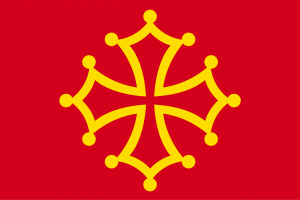Language/Occitan-post-1500/Vocabulary/Express-Surprise
Hi Occitan (post 1500) learners! 😊
In this lesson, we will learn how to express surprise in Occitan (post 1500). Surprise is a common emotion that we experience in our daily lives, and it's essential to express it in the language we are learning. It can help us build better relationships with native speakers, which leads to better communication and cultural understanding. So let's get started with this exciting lesson!
Take a moment to explore these relevant pages as you conclude this lesson: How to Say Hello and Greetings & Animals.
Common Expressions[edit | edit source]
Here are some of the most common expressions you can use to express surprise:
| Occitan (post 1500) | Pronunciation | English |
|---|---|---|
| Quin peston! | [kin pɛstu] | What a blast!/What a surprise! |
| Cala mi fa plan ! | [ka.la mi fa plan] | That makes me happy! |
| Es estranh /a | [ɛs ɛs'traɲ] / [ɛs ɛs'traɲə] | It's strange |
Here's an example dialogue to help illustrate these expressions:
- Person 1: Quin peston! Has vist aquò? (What a surprise! Have you seen this?)
- Person 2: Cala mi fa plan ! Non, qu'es aquò? (That makes me happy! No, what is it?)
- Person 1: Es estranh, l'ajut pas vista venir. (It's strange, I didn't see it coming.)
Idiomatic Expressions[edit | edit source]
Idiomatic expressions are words or phrases that don't have a literal meaning but are commonly used to express a certain feeling. Here are some idiomatic expressions you can use to express surprise in Occitan (post 1500):
| Occitan (post 1500) | Pronunciation | English |
|---|---|---|
| Fugir coma la pèl de l'infer. | [fu'dʒiɾ 'koma la 'pɛl də l'infɛr] | To run like hell. |
| Ne'n tòrna pas d'aver la boca abierta. | [nɛn 'tornas pas d'a'veɾ la 'bukɔ a'βjɛrtə] | To be unable to close your mouth |
| Veire veni lo sagèl | [ˈvejɾe ˈveni lu sa'ʒɛɫ] | To see the seal arrive |
Here's an example dialogue to help illustrate these expressions:
- Person 1: Fugir coma la pèl de l'infer! Frank èra encara vivent? (To run like hell! Frank was still alive?)
- Person 2: Veire veni lo sagèl! Negatiu, es mòrt lo mes passat. (To see the seal arrive! Negative, he died last month.)
- Person 1: Ne'n tòrna pas d'aver la boca abierta! Quina malur! (To be unable to close your mouth! What a shame!)
Fun Facts about Occitan (post 1500)[edit | edit source]
- Occitan is a Romance language spoken mainly in Southern France, Monaco, and parts of Italy and Spain - There are six varieties of Occitan which are Limousin, Auvergnat, Languedocien or Provençal, Gascon, Vivaro-Alpine, and Niçard - Occitan is the only language besides French to have ever been magna cum laude (with high distinction) at the Sorbonne, France's most prestigious University
To improve your Occitan (post 1500) Vocabulary, you can also use the Polyglot Club website. Find native speakers and ask them any questions!
Sources[edit | edit source]
➡ If you have any questions, please ask them in the comments section below.
➡ Feel free to edit this wiki page if you think it can be improved. 😎

